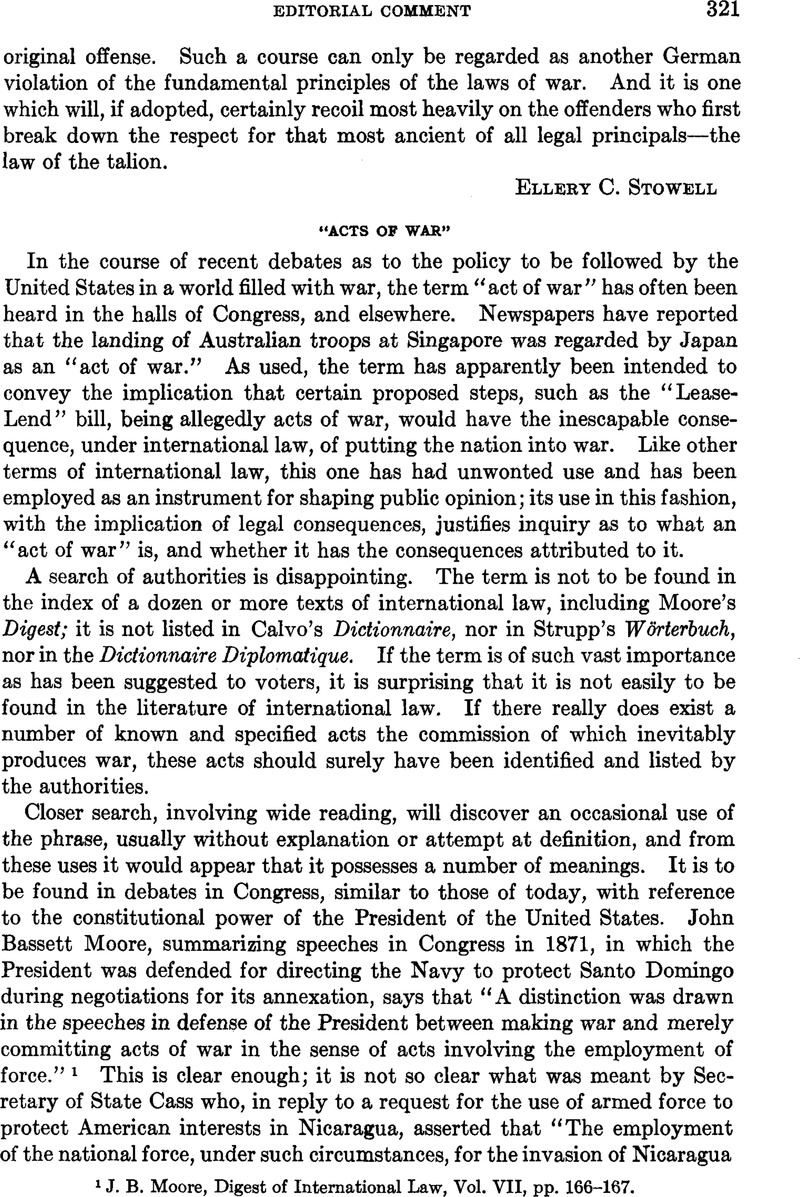Article contents
Abstract

- Type
- Editorial Comment
- Information
- Copyright
- Copyright © American Society of International Law 1941
References
1 J. B. Moore, Digest of International Law, Vol. VII, pp. 166–167.
2 Mr. Cass to Mr. Body, March 30, 1860, ibid., pp. 165–166.
3 Mr. Hunter to Mr. Turner, Nov. 7, 1876, ibid., p. 167.
4 See Moore, loc. tit., Sees. 1091–1093; J. Reuben Clark, Right to Protect Citizens in Foreign Countries by Landing Forces (Washington, 1912).
5 Moore, loc. cit., p. 153; see also J. L. Kunz, Kriegsrecht und Neutralitätsrecht (Wien, 1935), p. 5.
6 Forties Iuris Gentium, Series B, Sectio 1, Tomus 1, Pars 2, p. 81, No. 2398. Brazil replied that the manner in which the reprisals were carried on i.e., by exercise of force within Brazilian waters, was more than reprisal, and constituted an act of war; she did not contend that this meant a state of war. Ibid., p. 82, No. 2400.
7 Ibid., p. 88, No. 2413.
8 Ibid., p. 98, No. 2438.
9 Ibid., p. 79, No. 91.
10 Q. Wright, “Changes in the Conception of War,” this Journal, Vol. 18 (1924), pp. 756, 759; and on p. 759, he says: “apparently acts of war include only attacks on the territory or public forces of a state.”
“Allgemein angenommen, dass es sich um militärische Gewaltakte, urn Akte der bewaffneten Macht handeln muss. Daran ist soviel richtig, dass nach diesem Kriterium Akte der Retorsion und der nicht-militärischen Repressalien, dass sog. ‘Handels-, Währungs-, Zollkrieg’ hein Krieg im Sinn des Völkerrechts sind.” J. L. Kunz, op. tit., p. 5.
11 “As a general rule these means of putting pressure upon recalcitrant states were resorted to by stronger powers against weaker powers, the latter not being in a position to take up the challenge by a declaration of war.” C. G. Fenwick, International Law (New York, 1934), p. 433.
12 Foreign Relations, 1914, p. 476; see also Hyde, International Law, Vol. II, p. 178, where is quoted the Act of Congress of April 22: “That the United States disclaims any hostility to the Mexican people or any purpose to make war upon Mexico.”
13 Hyde, loc. cit., p. 181 and note 2.
14 D. H. Miller, The Drafting of the Covenant (New York, 1928), Vol. II, p. 79; see also the Cecil Plan, p. 63. Miller explains this change as an effort to avoid conflict with the American Constitution; it produced, as he says, “a very great change in meaning.” Ibid., Vol. I, p. 49.
15 League of Nations document A. 14.1927.V, pp. 43–43. Fauchille, in discussing this article, says “acte de guerre n’est pas nécessairement synonyme d’état de guerre.” P. Fauchille, Droit International Public (Paris, 1926), Vol. I, Pt. 3, p. 714.
- 3
- Cited by




